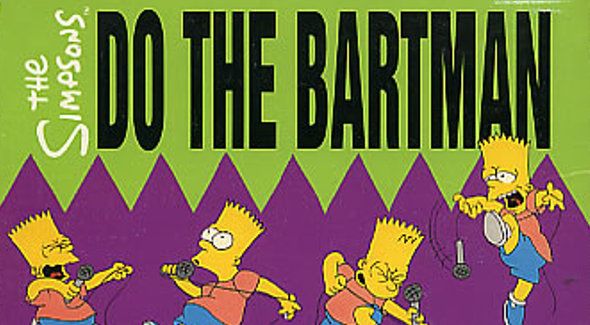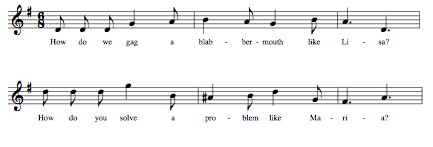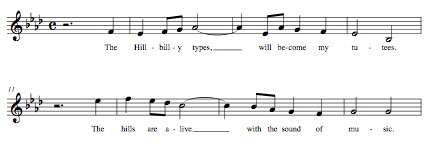
This is not a parody either, really. It's a... what is the word. Fiasco?
Man. Writing about The Simpsons is hard. Even though I’m still a fan, when I sit down to try to talk about the series, I find myself asking, “which series?” It’s been around for so long… the show itself has changed, and I’ve changed, so the way I relate to the show has changed a LOT. Trying to talk about all twenty years at once doesn’t even really seem possible. Note that I’m not one of those people who says that it used to be good and then jumped the shark. It’s just different now. (And it’s not just one before-and-after difference either. I can think of at least three or four different phases in the show’s development — or rather, in the development of my relationship to the show?)
I cannot for the life of me figure out a way to celebrate or analyze their 20th season. So instead I’ll just use The Simpsons as a jumping off point to talk about musical parodies, which have been much on our minds of late.
The Simpsons is notable for never licensing outside music (or at any rate doing it rarely). When they want to reference a specific song, they have the music staff come up with a version that’s juuuuust close enough. This is in contrast to South Park, which tends to reference styles rather than particular songs, and in contrast to Family Guy which tends to insert the songs unchanged for no reason other than that Seth McFarlane is kind of a giant geek.
You get to hear a bunch of the Simpsons‘ logrado musical numbers in the episode “Yokel Chords,” which is more or less a parody of The Sound of Music. Here’s the opening melody of “How do you Solve a Problem Like Maria,” and the Simpsons version, “How do you Gag a Blabbermouth like Lisa.”

And here’s the title song, with the Simpsons version first this time.

And just to prove that it’s not something that shows up in this episode only, compare Falco’s “Rock Me Amadeus” with the Simpsons’ immortal parody version, “Dr. Zaius, Dr. Zaius.” Falco’s melody leaps up a fifth between the “ma” and the “de” of the second “Amadeus.” The Troy McClure version doesn’t do anything of the kind: instead it just circles around a single pitch. And a similar transformation even happens to the synth line in the background.
In each parody version, the melody and melodic contour is quite different from the source — the “Hills are Alive” one even starts with a direct inversion, which is cute — but the rhythm is exactly preserved every time.
I’ve usually heard people say that Fox’s legal department demands that the Simpsons’ parody versions need to be juuust different enough that they could claim in court that the resemblance to the original song was a coincidence. (I’m pretty sure they even made a self-aware joke about it in a recent episode, although I don’t remember exactly where). But I don’t quite believe this for a second. After all, there are other ways to do musical parodies.
(I was going to go for “Like a Surgeon,” but this was the only Weird Al video I could find that allowed embedding. Go figure. And man, remember when this song and this movie both seemed worth mocking? Takes you back.) The main joke with this kind of Weird Al Yankovic song – the only joke, really, and a pretty durable one – is that while the lyrics are silly, the song is played straight. Now, Weird Al actually does get permission to do the things he does. But if he can get permission, The Simpsons could too, and I’d be willing to bet that they do get permission for the distorted versions that they use. After all, it’s not like they’re fooling anyone. Take a listen to “My Favorite Things,”
http://www.youtube.com/watch?v=irhroQ14Ufo
and the Simpsons approximation of it (at 2:05 into the video, which will probably get pulled off of Youtube by Fox before the week is out. They seem to be real jerks about that kind of thing.)
http://www.youtube.com/watch?v=LMen7rJX0Yc
Two things are interesting to me here. First, Julie Andrews seems to find the “My Favorite Things” melody just as insipid as I do, because she can’t get through a stanza without just speaking a couple of the lines. Second, both versions start out in minor and then give you a major-mode version – the “girls in white dresses” part in The Sound of Music, and the “pretentious laughs” bit in “Yokel Chords.” This is similarity is on a rather different order than just having the same rhythm. Put the two together, and you end up with something that’s quite, quite clearly derived from The Sound of Music, and music derived from preexisting music is just as much of a copyright violation as using the preexisting music outright. (Of course, The Simpsons could always argue that as a parody it’s fair use… but the Weird Al version is fair use too, and in any case I can’t imagine a massive corporation like Fox risking their money on something as unreliable as a fair use defense.)
So if these parodies aren’t a CYA move forced by the legal department, why do it? My guess is that they do it because it’s funny. The feeling of “close but not quite” that these songs create is much, much funnier than the Weird Al joke of “Hey, he’s singing like Madonna!” And more consistantly funny than the Family Guy joke of “Hey, they stopped the show for five minutes to insert a musical number!” Swinging wildly, this might suggest that keeping the rhythm and song structure but changing the melody has the same comedic value as keeping the rhyme scheme and changing the subject of a poem… which would sort of imply that that melody plays the same role in music* that semantic meaning plays in language. And that’s interesting because it’s an idea that has been floating around in philosophy-of-music circles for I think literally centuries, without any conclusive evidence for or against it. I wouldn’t call this a conclusive argument either. But look at another song from South Park, “Up There”. This meaning of the lyrics here is pretty much identical to the meaning of the lyrics of “Part of That World” from The Little Mermaid. But is it a parody of “Part of That World?” “Up There” is hilarious, sure, but is there anything comedic about its relationship to the older song? Not so much. For the melody version, take an example right out of The Music Man itself, where “Goodnight My Someone” and “76 Trombones” are radically different arrangements of the same melody. This is kind of funny for a second when you first notice the resemblance, but could you say that either song is a parody of the other?
So… yeah. Simpsons! Here’s to twenty more years, I guess.
* where by music, I obviously mean mainstream Euro-American tonal music

Actually, citing parody is a pretty standard way to get away with exactly that kind of thing. Weird Al doesn’t need to ask for permission, but he does anyway as a courtesy. Similarly, Fox could probably get away with more direct parodies, but instead, the choose to pad the song with a level of legal insulation, just in case.
I’m reminded of that Futurama where Leela winds up in a Wizard of Oz parody, and the munchkins all surround her, singing “We represent but are legally distinct from the Lollipop Guild.”
I’d like to see some more explication of how/why these parodies are so instantly recognizable, even with different melodies and lyrics. Is the cadence of words really enough, or do we, the audience, pick up on something subtler and harder to define?
Sorry to double-post, but something else just occurred to me about “Up There”/”Part of That World.” Isn’t the parody in “Up There” heavily rooted in its cinematography as well? The style and subject matter certainly suggest that it’s poking fun at The Little Mermaid, but it’s that shot near the end of “Up There” (about 1:32 in the video you posted), where Satan looks up at a hole in the ceiling, yearning for a glimpse of that above-ground world where it eventually leads, echoing the iconic image of Ariel doing the same thing (start around 2:30 in the video you posted and continuing through to a climax around 3:40).
So to answer your question but is there anything comedic about its relationship to the older song?
I think the answer is an unequivocal YES. Parker and Stone have taken an old fairy tale-turned-Disney film about a mermaid princess and recast it with a muscle-bound big red (and very GAY) Satan as the princess! How is that not funny? How is that not parody?
…Sorry, got a little worked up there.
Dude… you just blew my mind with that Music Man thing.
A truly excellent and insightful post. Your articulation of the differences in parody style among “South Park,” “Family Guy” and “The Simpsons” is dead on. Well done sir!
The last paper I wrote in college was on the relationship between The Simpsons and the Hollywood musical, so I appreciated this post very much so. I have nothing insightful to add at the moment, just wanted to say big ups, mostly because that is a silly thing to say.
Have you considered the possibility that the writers of the Simpsons might simply like to compose a musically homage on occasion? Harry Shearer is a writer for them, after all.
@Jon Eric: I could’ve sworn that I had heard something a decade or so ago, about Weird Al wanting to do a parody, but some artist not giving him permission… I could be remembering incorrectly, though. Also, I’d always just assumed that the reason he sometimes did style parodies was because those artists wouldn’t allow him to parody specific songs… but that was just supposition, not anything I ever read or heard.
I’d like to propose a couple of interconnected reasons for the way in which the Simpsons writers choose to do musical parody. First, for anyone who is musically aware and enjoys composing, playing with the melody while keeping the song recognizable is quite frankly a lot more *fun* than just writing silly lyrics. Second, when they’re parodying entire shows (like the Sound of Music one referenced, or the brilliant Evita parody) it’s kind of boring for the *viewer* to sit through song after song pulled directly from the source. It’s more interesting and attention-grabbing to make the audience have to think about how the songs *differ* from said source. Lastly, I think they kind of WANT people to believe that they are just sneaking in on this side of legal, because it adds to the show’s “image” as a program that sort of thumbs its nose at convention/society/legality/etc. So, even if they DO pay for the rights, they want their viewers to think that they don’t.
Anyway, lovely article!
@Genevieve: You’re probably thinking of the brouhaha surrounding “Amish Paradise.” Weird Al received permission from Coolio’s label to do a parody, and he thought the label had talked to Coolio as well. After the song was released, Coolio said he hadn’t given permission, and thought the parody was disrespectful, so on and so forth.
Also, IIRC, Billy Ray Cyrus only gave Weird Al permission to do a parody of “Achy Breaky Heart” (“Achy Breaky Song”) if he gave the proceeds to charity; Eminem gave permission to do a parody of “Lose Yourself,” (“Couch Potato”) but not to do a video (highly unfortunate); and James Blunt initially gave permission to do a parody of “You’re Beautiful,” (“You’re Pitiful”) but withdrew the permission right before the album was to be released, so Weird Al pulled it from the album and released it as a free MP3 download instead.
(I know too much about Weird Al, clearly.)
On The Simpsons: my favorite episode of this type is the Mary Poppins parody, Shari Bobbins (“I’m an original character, just like Rickey Rouse and Monald Muck.”) The songs are done with such clear affection for the source material that it makes the spoof much funnier. “Cut Every Corner” (a parody of “Spoonful of Sugar”) is a classic of the form, and one of the best moments in the entire Simpsons’ run.
@Jesse and Genevieve – I agree %100 that this kind of musical reference is fun to create. And Genevieve, the idea that they use this to seem transgressive is brilliant. It’s like the “Shh! Do you want to get sued?” line from the “The Shinning” Haloween segment. Obviously if they really could get sued for it, they wouldn’t have put that line in. But the fantasy that someone might get sued for it makes the whole thing seem more daring.
@Jon Eric – I know that parody is legally protected, but I’ve noticed that there’s a difference between “what copyright law actually allows” and “what a publisher is willing to risk getting sued over.” Getting sued is, honestly, a drag. Even if you win, even if you manage to countersue for court costs or whatever, you’ve already basically lost because of the time and energy involved, and the opportunity costs, and so on. But you might be right, I don’t know. Is there any way of actually finding out how many parodies get permission first? (Here I’m talking about parodies released by companies with a legal compliance department.)
In response to your second comment: I see the humor you’re talking about, but I’d say the comedic relationship is not between “Part of That World” and “Up There,” but rather between Ariel and Satan. Again you could relate this to Weird Al: when he does a Madonna song, there’s a comic dissonance between her smoldering-disco-sexpot persona and Weird Al’s adenoidal-polka-fiend persona.
Now, the performer’s persona is an INCREDIBLY IMPORTANT part of how we experience music. So I think maybe we need to consider three possible forms of musical parody.
1) Change the lyrics to comic effect (typically keeping the rhyme scheme). Weird Al always does this. So do the writers for The Simpsons. I don’t think it’s the interesting part of their parodies, but it’s there.
2) Change the performer’s persona to comic effect. Weird Al sometimes does this, but not always: it depends on how well-defined the original artist’s persona is. (I wouldn’t say that the “Gump” song gets a lot of mileage out of this, for instance.) Arguably, the Jenny Owens Young version of “Hot in Herre” that Perich linked to in his post on musical parody would be another example of this. And South Park certainly does it with “Up There.”
3) Change the music itself to comic effect. This is where The Simpsons really shines. I wouldn’t say that they’re the only ones to do it, but they seem to be interested in this kind of play in a way that South Park and Family Guy are not. Can anyone think of other examples from TV? (Peter Schickele would be the all-time grand master, I guess, but he was on the radio.)
Re: 3) Psych is a fantastic example of this. They have a LOT of episodes that are film parodies, and when they do that, they always use music that is just-different-enough from the music of the source film to be hilarious to anyone paying attention. The Indiana Jones ep is a great example.
Also, Peter Schickele ref, nice!
Campbell v. Acuff-Rose Music, Inc. (1994)
That’s the supreme court case that defines the rules on parodies, basically giving writers cart blanche on using existing music material for parody purposes. It’s the case that Weird Al cites, although yes, he always does get permission from the artists he parodies.
Echoing Mike M’s sentiments, I was shocked to hear the connection between 76 Trombones and Goodnight, My Someone. Oh, and bonus points for using the Kristin Chenoweth version. :)